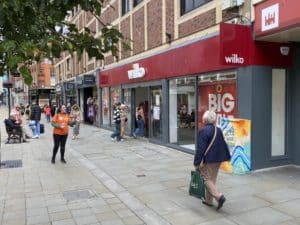
It has been the sixth wettest July since records began in 1836 as the rain hammered down from grey skies to deal the UK high street another blow.
British retailers reported a bigger-than-expected drop in sales, in July, as heavy rain put off shoppers who are also feeling high inflation and 14 back-to-back increases in interest rates.
Sales down in the wet.
Official data showed sales volumes in the wet summer high streets last month were 1.2% lower than in June. Economists polled by Reuters had forecast a 0.5% drop.
Sterling weakened as investors assessed how much the sales drop represented a warning sign about a slowdown in Britain’s sluggish economy, beyond the hit caused by the sixth-wettest July in records dating back to 1836.
Summer washout.
“It was a particularly bad month for supermarkets as the summer washout combined with the increased cost of living meant sluggish sales for both clothing and food,” Heather Bovill, deputy director for surveys and economic indicators at the Office for National Statistics said.
“Department store and household goods sales also dropped significantly.”

Many shoppers went online rather than get wet with 27.4% of retail sales taking place via the internet, up from 26.0% in June and the highest share since February Food stores sales volumes fell by a monthly 2.6% while non-food stores sales volumes fell by 1.7%
After the heatwave comes the rain.
The drop followed a strong June for retailers who were boosted by a heat-wave.
As well as the unpredictability of Britain’s weather, consumers have been hit by high inflation which stood at almost 7% last month, down from a peak of about 11% last October but still the highest among the world’s large rich economies.
However, July’s data represented only the second time that sales volumes fell on a month-to-month basis so far in 2023, suggesting resilience in consumer demand.
Economists warn that the steady interest rate hikes will hurt.
Some economists said the impact of the steady rise in interest rates by the Bank of England would inevitably hurt consumer spending in the second half of 2023.
“Our view is still that the growing drag on activity from higher interest rates will eventually generate a 0.5% peak to trough fall in real consumer spending,” Ruth Gregory, deputy chief UK economist at Capital Economics, said.





